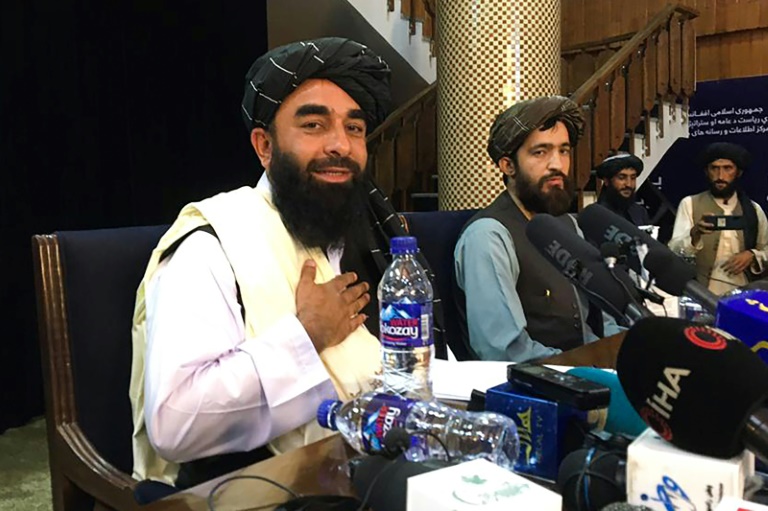Smiling and waving at journalists, posing for selfies in the streets and even sitting down for a TV interview with a woman journalist, the Taliban appear to have launched a public relations blitz, telling Afghans — and the world — that life under their rule will be different this time.
But Taliban 2.0 is a hard sell.
Memories of the militants’ brutal 1996-2001 regime and the near-two-decade insurgency that killed tens of thousands are etched on Afghan minds — especially women and religious minorities.
What are the Taliban promising?
“On ideology, and beliefs, there is no difference,” longtime Taliban spokesman Zabihullah Mujahid said in his first press conference, held Tuesday in the building where the now-collapsed Afghan government used to brief the media.
“(But) based on experience, maturity, and insight, no doubt there are many differences.”
He ticked off all the boxes — a full amnesty for all, women would have rights, including to education and work, the media would be independent and free, and an inclusive government would be created in a country where ethnic and sectarian rifts run deep.
Another Taliban official sat down for a one-on-one interview with a woman journalist on TV to press the point.
They have also vowed that Afghan soil will not be used against other nations, and that they want to be a part of the international community.
In arguably one of their most astonishing gestures, they sent representatives to a ceremony marking Ashura, one of the most important periods of the year for Shia Muslims — considered heretics by many hardline Sunnis, such as the Taliban.
The assurances have been coming for months, but the have been few details.
And all the vows come with a caveat: everything must be in line with the principles of Islam, as they interpret it.
Why is there such low trust in the Taliban?
Few have forgotten the first time they imposed their ultra-conservative version of Islamic law on Afghanistan.
Women were excluded from public life, girls could not attend school, entertainment was banned and brutal punishments were imposed — such as stoning to death for adultery.
They were internationally condemned for massacring civilians, particularly religious minorities such as Shia Muslims, who remained a target of deadly bombings and targeted killings even after the Taliban were toppled in 2001 for hosting Osama bin Laden and Al-Qaeda.
Much like last week, the Taliban promised general amnesty to their opponents when they first captured Kabul 25 years ago.
“We do not believe in any kind of revenge,” their leader Mullah Omar told Kabul residents on September 25, 1996.
Two days later, the Taliban shot former president Mohammed Najibullah, dragged his bloodied body outside and hung it from a post.
While the group is trying to show a moderate, new face from Kabul and Doha, reports have emerged of their fighters harassing journalists and not letting women enter universities in some parts of the country.
Images of women have been covered up or vandalised on storefronts around Kabul.
And their enforcers in rural Afghanistan and smaller cities are still reportedly brutalising people.
Just over a week before capturing Kabul, the Taliban claimed responsibility for killing the head of the government media centre — the same place where their spokesman spoke of independent journalism on Tuesday.
“They have better PR now… They can speak English, they can talk to the international media,” Pashtana Durrani, who runs a women’s education charity in the southern city of Kandahar, told Britain’s Channel 4 in an interview.
“What they are saying in press conferences and what they are doing on the ground… are two different things,” she added.
“It’s a grave reality that they haven’t changed, they’re the same people.”
Do Afghans and the international community believe their new promises?
Not yet.
Despite their months-long campaign of assurances, terrified Afghans had been trying to leave in droves even before the capital was captured by the militants.
As Taliban fighters entered Kabul, the fear was palpable — tens of thousands desperately rushed to the airport hoping to get on a flight out.
Women have largely stayed off the streets of cities out of fear.
Journalists and those who have worked with Western governments and organisations who could have not been able to leave say they are terrified of Taliban reprisals.
And the Taliban’s promises have yet to win them any diplomatic recognition, though they have received positive signals from Russia and China — and have longstanding ties with Pakistan and Iran.
Afghanistan’s fragile economy was propped up on international aid for two decades.
Analysts and officials say there is no guarantee it will get the funds it needs unless Western donors are convinced that rights are protected and groups like Al-Qaeda no longer find haven in Afghanistan.
British Prime Minister Boris Johnson on Wednesday echoed warnings from other governments, including the United States: “We will judge this regime based on the choices it makes and by its actions rather than by its words.”











